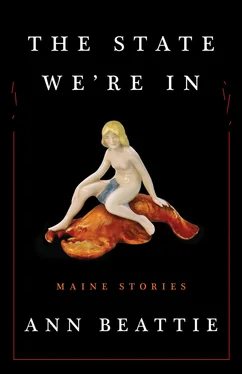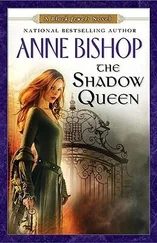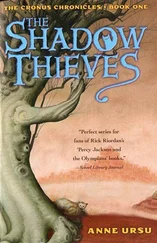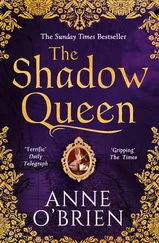The whole world’s full of stories. I never doubted that. Every writer will tell you the same thing: it’s next to impossible to find the inevitable story, because so many needles appear in so many haystacks. Most writers spend their entire careers — those who are lucky enough to have them — considering endless piles of hay, praying, just praying that a needle will prick their finger.
I suppose it pricked mine when I opened my door and saw Mrs. Terhune standing there with Duff Moulton. The union radiated inevitability, though I’m sure it was more apparent to me than to them. I was the spinner of tales whose closed-off world had been pricked like a big bubble. As with any accident — because accidents are by definition unexpected — you react instantly to that unmistakable, tiny stab of pain, so you rub your finger on your pant leg or you suck it for a second. It’s a tiny, split-second annoyance unless it’s bleeding all over everything, and you’re embarrassed when people see that you’ve been hurt, so you insist that you haven’t been.
The house at the end of our dead-end street had been for sale almost a year when two girls and a boy broke into it through the back bathroom window. They were kids from the neighborhood: Genevieve, Blake, and Ted. Genevieve and Blake were unlikely friends, Blake tall and lively, with ear piercings and blue fingernails, Genevieve very pulled together, more French than her mother born in Avignon (which her daughter had never seen and Mrs. DuPenn did not remember). Genevieve was always called Genevieve, though Blake was sometimes called Fuzzy. Ted was really Edward.
Barbara Gillicut, the Re/Max agent who had the listing of what the neighborhood kids called “the abandoned house,” posted no photographs online except of the exterior. There was never an open house, and no one from the neighborhood asked for an appointment to view it, and for a while after the owner left, there was no word of its contents. Who knows why kids would get obsessed with something as ordinary as an empty house. But they did. They began to gather there in the evening and to peek in the windows, though they didn’t see much of what was inside until they finally broke in and went into the room at the back, the one without windows.
Jon Enders, the owner, had seemed pleasant enough when he first bought the house — but that means next to nothing nowadays, I suppose. He hadn’t exactly thrown a neighborhood barbecue, but when I dropped by with a paper plate of brownies he invited me in and we sat in the front room, which was beautifully arranged, though very spare: two chairs (two!) facing each other, each upholstered in a slightly different shade of blue velvet, and an enormous coffee table with a few stones on it, along with orchids whose budding stems were staked with chopsticks, and fashion magazines from foreign countries. Not all were fashion magazines. I went home with a borrowed Paris Review , which I found most enjoyable. Years ago, I’d worked at Le Pli salon in Cambridge, Massachusetts, coloring hair. Several models from the same agency often came in to get their hair foiled on the same day. One had lived in Paris in her teens and brought me madeleines. Another, an American girl from the South, brought me the best peanuts I’d ever tasted, which changed my mind about that nut. I don’t think the other ever brought me anything, but like her friends, she was nice and tipped big.
If Jon had visitors, they were few, though in the summer months I saw stylish cars go to the end of the street, and once I was curious enough to step out to see if the silver Miata was parked in Jon’s driveway again (it was), but beyond that it wasn’t a socializing sort of neighborhood — which was why I thought the custom in our town of teasing newcomers into having a barbecue, then never reciprocating, was pretty mean. “Trial by fire!” my husband said. “Get it? It’s a pun: the ‘fire’ of the barbecue.” He was always pleased when he made a pun.
The first time the kids broke into the house, Genevieve told her mother about it later, because she told her mother everything. I was visiting Marie when Genevieve made her confession — perhaps thinking I’d be protection of some kind, and that her mother wouldn’t scold her in front of a visitor. She reported that there was a mysterious door locked with a padlock. The dining room didn’t even have a table, just a stand with a vase on it, and upstairs in one of the bedrooms there was a rowing machine and a set of free weights and a stationary bicycle and a flat-screen TV mounted on the wall. There was a bed and a bedside table in the other bedroom, nothing else. The bed was covered in what Genevieve described as some “elaborate quilted sort of Indian patterned thing, with little mirrors and all, and knots that looked like raspberries. Mostly silver and gray.” I listened with interest, because Jon had not offered me a tour of the house the time I visited. Genevieve said that there was also a chair in the upstairs hallway that she didn’t see at first because it was a ghost chair — one of those stylish chairs you can see right through. But the strangest thing — and here she became quite excited, in that young-girl way she has that’s going to charm boys forever… she said the shower curtain was the worst-looking thing she’d ever seen, printed all over with neon signs in really bright paint, made to look like they were glowing. VIVA LAS VEGAS! appeared in green, orange, red — every possible color. When she left the room, Marie DuPenn rolled her eyes and said, “At least we can be thankful there wasn’t some woman chained to the wall who had to give the owner blow jobs or be electrocuted.”
When my husband got back from work I told him what I’d heard, and all he had to say was that in this day and age, he didn’t understand why people didn’t install sliding doors on their bathtubs. Our tubs had been replaced with shower stalls tiled in restful colors, the upstairs one with flooring called River Rocks.
“You have to admit that he was strange,” I said, “hardly furnishing his house and nobody ever seeing him in the yard all the time he lived here.”
My husband lived to refute me: “The guy figured out he’d bought a house in a boring town and he got out.” Also, it was “Mrs. DuPenn’s job to deal with her daughter’s information, not ours.” He tended to speak of people in the neighborhood formally — a habit he’d acquired being a lawyer.
To be honest, I didn’t think the kids would break in a second time, though I was wrong. This had often been the case with our own son — my misguessing. Caleb was now making a fortune in Silicon Valley, driving a Beamer convertible, and engaged to an extremely interesting girl, a biologist who’d graduated from Harvard. One of the things I hadn’t thought Caleb would do, years ago, was act on his intense hatred of the local high school, let alone blow up the toilet in the teachers’ bathroom. Also, I hadn’t expected that when he had a teenage crush on a tourist, he’d hitchhike to Colorado to see her — or that had been his intention until the police picked him up. I could give other examples of him just being a boy, but since his life has worked out fine, best to forget — including what he did to the leftover anatomy lab frogs.
When they broke in the second time, Ted, Genevieve, and Blake tried to be as quiet as possible, but Rollins the dog — who lived in the house next door to Jon Enders’s — saw them and began barking and wouldn’t stop, which drew my attention to what might be happening. Sure enough, when I walked a little way down the road I could see that the door was wide open. There was no light when I entered the house, just Ted shining his flashlight around the walls, and Blake running into the beam of light whenever she could, pretending that Ted was trying to put her in the spotlight. Once I stepped inside, he turned off the flashlight pretty quickly, and that left whatever moonlight seeped though the door and windows. For a split second it was my impulse to turn and run. I thought I’d walked into some Jeffrey Dahmer ghoulishness. Somehow, they’d pried open the padlocked door and heads were everywhere, though the lampshades put them into some perspective. “You came! You came!” Genevieve said, once they’d gotten over their fear that I was the police. Closer inspection (Ted leading the way) revealed what I’d seen to be busts of Elvis, arranged every which way on metal tables — the long kind that people use outside for buffets. Some were chipped, missing a chunk of nose, or a bit of white showing through pink lips. Hardly any depiction seemed exactly right, though as they circled and examined the lamp bases they instantly started a game, as Ted’s flashlight danced over them: Find the Best Elvis. There would be a scratched cornea, just when Blake thought she’d won, or Genevieve would point out a missing black curl behind an ear. The lamp bases were about three feet high, minus their shades: Elvis in sunglasses; Elvis wearing a high white ruffled collar; Elvis with glitter on his cheekbones; Elvis with superlong eyelashes, a mascara fanatic’s dream.
Читать дальше












